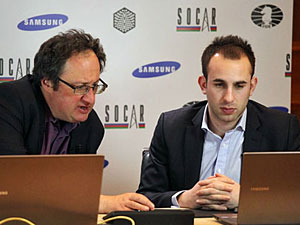



From March 14 to April 1, 2013, FIDE and AGON – the World Chess Federation’s commercial partner – are staging the 2013 Candidates Tournament for the World Chess Championship 2013. It will be the strongest tournament of its kind in history. The venue is The IET, 2 Savoy Place, London. The Prize Fund to be shared by the players totals €510,000. The winner of the Candidates will become the Challenger to Viswanathan Anand who has reigned as World Champion since 2007. The main sponsor for the Candidates is State Oil Company of the Azerbaijan Republic SOCAR, which has sponsored elite events chess in the past.
| Round 8 March 24 at 14:00 | ||
|
Magnus Carlsen
|
½-½
|
Levon Aronian |
|
Teimour Radjabov
|
0-1
|
Boris Gelfand |
|
Alexander Grischuk
|
1-0
|
Vassily Ivanchuk |
|
Vladimir Kramnik
|
1-0
|
Peter Svidler |
|
Playchess commentary: GM Alejandro Ramirez
|
||
Here is the live commentary from round eight, in case you missed it yesterday. The main commentators are GM Robert Fontaine and IM Lawrence Trent.
Magnus Carlsen of Norway and Levon Aronian of Armenia are still tied for first place after eight rounds at the FIDE World Chess Candidates' Tournament in London. The leaders of the tournament faced each other over the board on Sunday and drew a Catalan game in just an hour and a half.
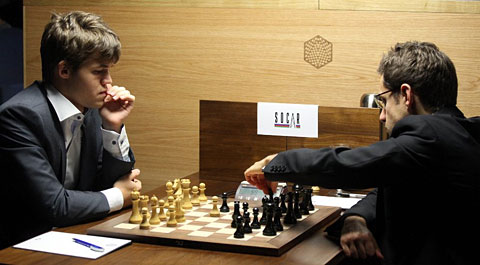
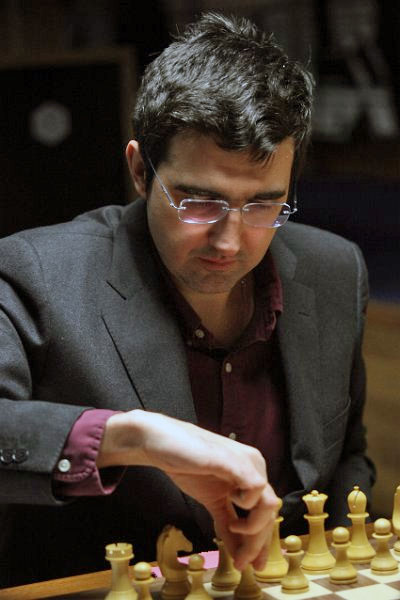
Vladimir Kramnik of Russia, who beat his compatriot Peter Svidler in a Grünfeld, is now one point behind the two.
“Now it became clear why Kasparov dropped the Grünfeld after game two in our match. Finally I showed the refutation of this opening!” joked Kramnik, which put a little smile even on Svidler’s face. “I thought that my victory was yesterday because after this absolutely awful, unexplainable blunder which I made, I was forgiven and I somehow considered it as a good sign. I still cannot explain how I managed to make such a blunder but I think it was a turning point, at least I hope so, that I start to get luck on my side and start to go on with full force, let’s see.”
For the third time already in this tournament, Ukrainian Vassily Ivanchuk lost on time, in this round against Alexander Grischuk of Russia. It was a Sicilian Dragon and the position was always more or less equal, but, staying true to their “style”, both players got into time trouble. Ivanchuk didn't make the time control yet again.
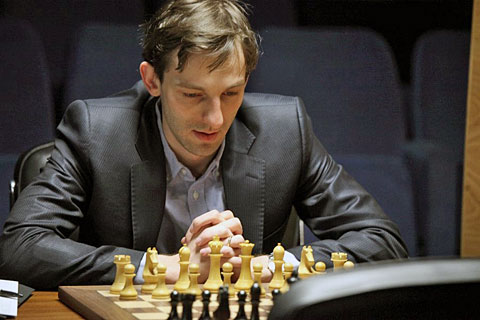
It was a Sicilian Dragon and the position was always more or less equal, but, staying true to their “style”, both players got into time trouble. Ivanchuk didn't make the time control yet again.
Asked about the time control in London (40 moves in 2 hours, then 20 moves in 1 hour and then 15 minutes plus 30 seconds increment from move 61), Grischuk said: “Where you have a move limit, it’s correct that you don’t have increment. It’s your own responsibility that you think about the time. But at the end of the game it’s correct to have increment because otherwise it can go on and on. The problem is that we are all spoilt by the fact that most tournaments are held with increment. It’s difficult to switch. But I think this is the right time control.” Ivanchuk’s response to the same question was: “It’s a matter of taste. I cannot say there is a time control that everybody likes.”
Like Kramnik, Boris Gelfand of Israel won his first game of the tournament. He defeated Teimour Radjabov of Azerbaijan by adopting the strong positional concept 13...e5! in an English game.
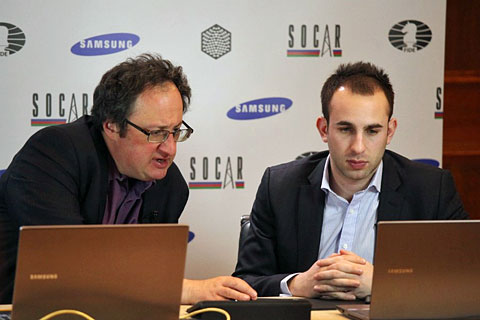
Gelfand (analysing above with Lawrence Trent) defeated Teimour Radjabov without much effort, thanks to a powerful new idea in the English opening on move 13. “It's a big positional concept. It cuts both the bishop on g2 and the knight on b3,” explained Gelfand afterwards.
Radjabov never really got into the game. “Somehow I didn’t find a way to execute the g4-g5 plan. I was surprised that I had to play for equality. I was only right about my estimation, not about my moves.” Gelfand, who didn’t need much time on the clock: “I know that I am better and I know what I have to do, that’s why I played very quickly. The problem is on white’s shoulders.”
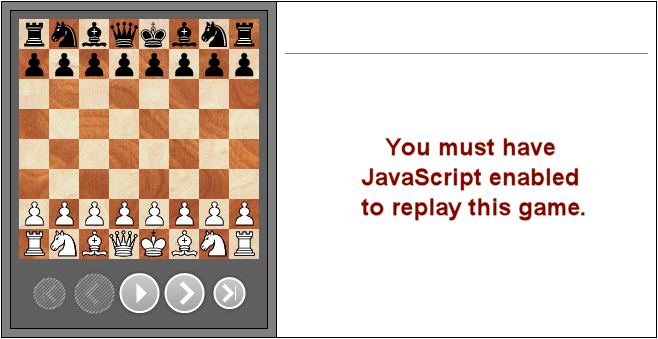
Select games from the dropdown menu above the board
|
|
||||||||||||||||||||||||||||||||||||
|
|
||||||||||||||||||||||||||||||||||||
|
|
||||||||||||||||||||||||||||||||||||
|
|
||||||||||||||||||||||||||||||||||||
|
|
||||||||||||||||||||||||||||||||||||
|
|
||||||||||||||||||||||||||||||||||||
|
|
||||||||||||||||||||||||||||||||||||
The games start at 14:00h = 2 p.m. London time = 15:00h European time, 17:00h Moscow, 8 a.m. New York. You can find your regional starting time here. Note that Britain and Europe switch to Summer time on March 31, so that the last two rounds will start an hour earlier for places that do not swich or have already done so (e.g. USA). The commentary on Playchess begins one hour after the start of the games and is free for premium members.
LinksThe games will be broadcast live on the official web site and on the chess server Playchess.com. If you are not a member you can download a free Playchess client there and get immediate access. You can also use ChessBase 12 or any of our Fritz compatible chess programs. |